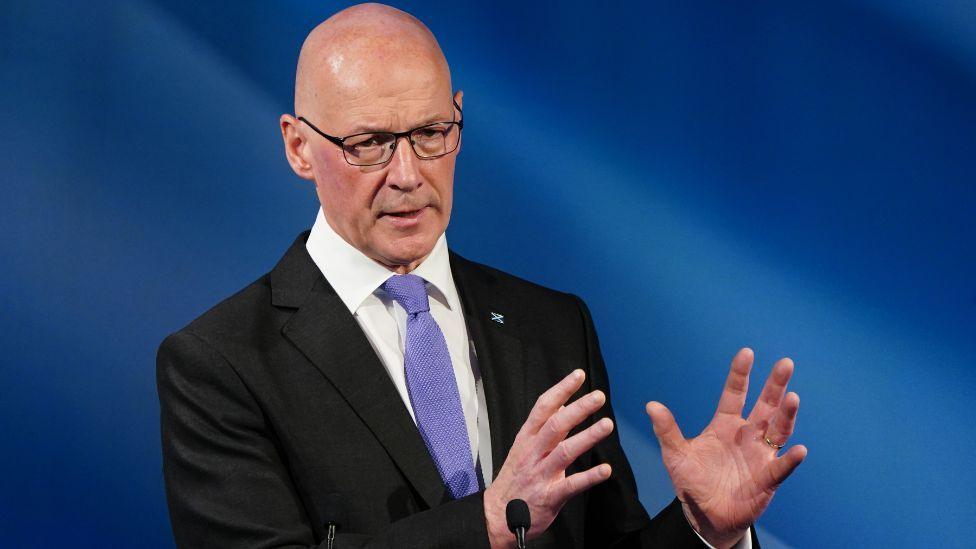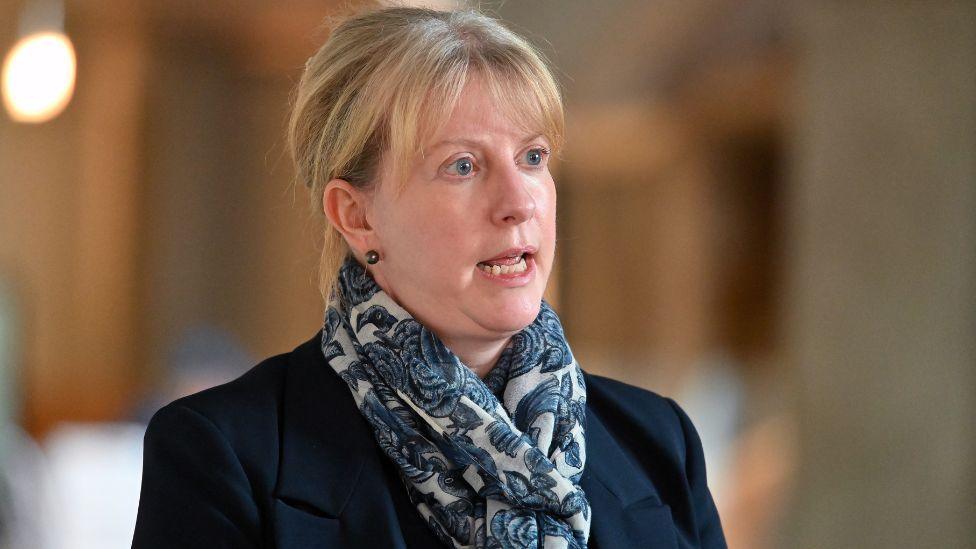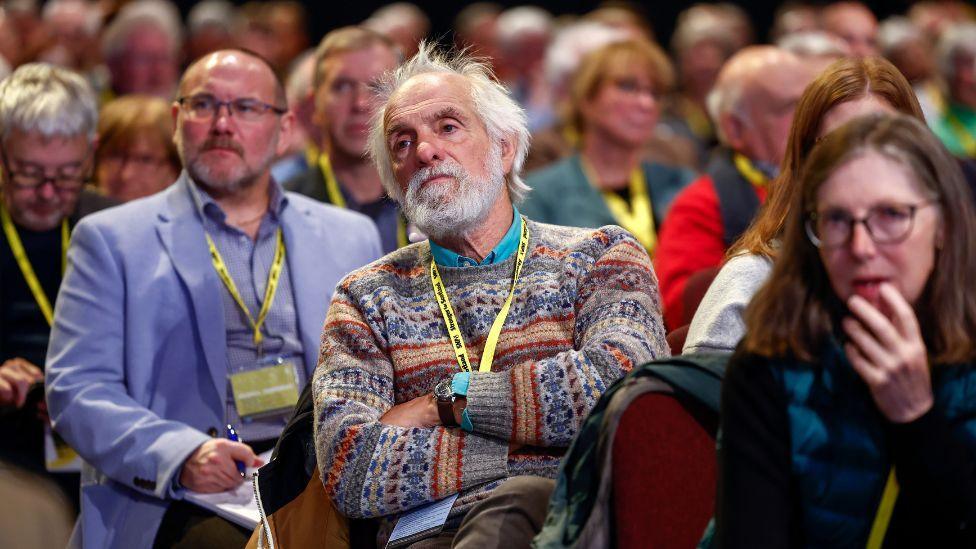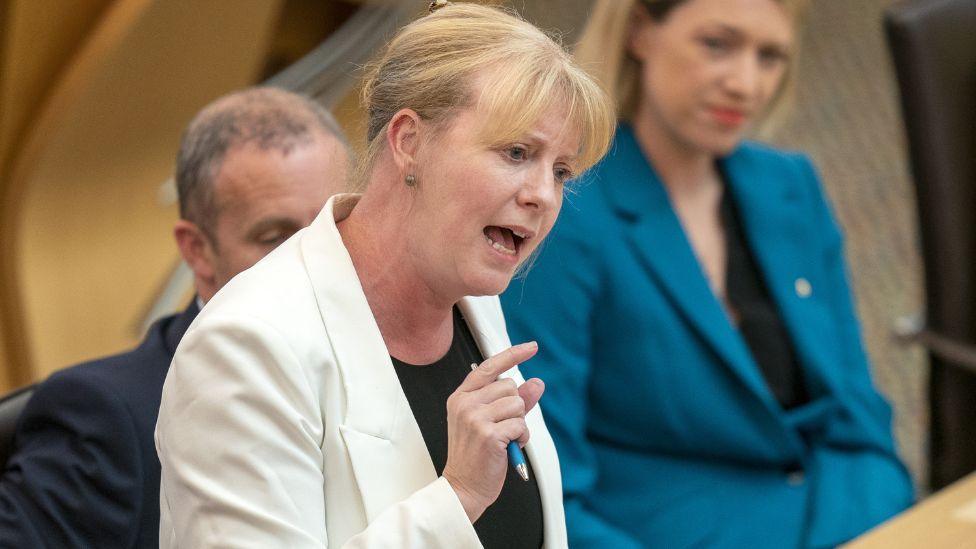John Swinney rules out cuts to universal benefits

First Minister John Swinney spoke to BBC Scotland News ahead of the SNP conference
- Published
First Minister John Swinney has ruled out cuts to universal benefits such as free university tuition and prescriptions.
However, the SNP leader warned that difficult spending choices would have to be made in this year's budget.
He said the government was grappling with "sky-high inflation" as it tried to meet public sector pay demands.
Speaking ahead of the SNP conference in Edinburgh, Mr Swinney insisted the party would offer the "hope Scotland desperately requires".
The Scottish government has introduced emergency curbs on all "non-essential" spending as it negotiates pay deals with council workers, doctors, nurses and teachers.
Ministers have already announced several cost-cutting measures - introducing means-tested winter fuel payments, the return of peak rail fares, scrapping free bus travel for people in the asylum system and delaying a digital devices programme.
'Social contract'
Asked if universal benefits would be "on the table" for cuts, Mr Swinney replied: "No, they're not.”
He said Scotland had a “social contract”, with those with the “broadest shoulders” paying more in tax to fund universal access to free university tuition and prescriptions, as well as wider access to concessionary travel and childcare.
The first minister told BBC Scotland News: “So our social contract is a combination of asking those on higher earnings to pay slightly more in taxation - that generates about £1.5bn of extra investment in our public services - and then the provision of a range of universal services from which everybody benefits.”
People who earn more than £28,850 in Scotland - slightly above median earnings - pay more income tax than they would elsewhere in the UK.
The first minister's comments come after Caroline Lamb, the Scottish government’s director general for health and social care, reportedly warned that public finances were approaching a “tipping point”.
According to The Times, external, she told civil servants that universal benefits could be among those considered for cuts.

Finance Secretary Shona Robison is due to set out spending cuts to parliament
Finance Secretary Shona Robison is due to set out in-year cuts in a statement to parliament next week. The Scottish government will announce more comprehensive spending plans for 2025-26 in its budget later this year.
Mr Swinney vowed the Scottish government would meet the legal obligation to balance its budget, but warned that spending reductions would be necessary.
He said “sky-high” inflation had eroded the value of public spending.
"No UK government has taken account of that in the decisions that they have made," the SNP leader said. "And that poses a very real challenge for the Scottish government.”
He said Prime Minister Sir Keir Starmer had “ushered in a new era of austerity under a Labour government, having promised to do the exact opposite in the election campaign”.
It came after the Labour leader warned October's UK Budget would be "painful", citing a a £22bn black hole in Treasury finances.
Mr Swinney added: “Yes there will have to be reductions in government expenditure to pay for the pay deals and the challenges that we're facing, but we'll still be delivering very significant investments in the Scottish economy and acting to address the government's priorities, of ending child poverty, of investing in net zero, of strengthening the economy and in making sure that we improve our public services.”
'Live within your means'
The Scottish government has faced criticism from political opponents and economists for not budgeting for higher public pay deals in this year's budget, which Mr Swinney said would cost more than forecast.
Asked if ministers made a mistake, he replied: "Not necessarily because you've got to live within your means.”
The first minister told BBC Scotland News: “You can only set out in your budget what you can afford.”
At last year's SNP conference, then SNP leader Humza Yousaf announced a council tax freeze.
The Scottish Fiscal Commission - an independent watchdog - said the freeze, more generous public sector pay deals than in other parts of the UK and social security reforms had all “added to the in-year pressures” facing the government.
But Mr Swinney defended his predecessor's decision, describing it as a "practical" measure to help families during the cost of living crisis.
The government could not impose a nationwide freeze on council tax, which is overseen by local authorities.
Instead, it offered financial incentives for councils to comply, with all agreeing to doing so by April. At that point, the government said, external it had allocated £147m to local authorities, with a further £62.7m pledged.

This year's SNP conference is being held in the capital
The SNP conference starts in Edinburgh on Friday, with the first minister presiding over a behind-closed-doors post-mortem examination of the party's election performance last month.
The SNP returned just nine MPs, down from 48 in 2019.
As well as speeches from senior party figures, there will be "policy discussions" with Scottish government ministers including Deputy First Minister Kate Forbes, Constitution Secretary Angus Robertson and Finance Secretary Shona Robison.
Mr Swinney said: “My message to the party conference will be that we are the party that can deliver hope and ambition for Scotland by setting out that our strong, financially viable and successful country can do an awful lot better as an independent country.”
- Published27 August 2024

- Published27 August 2024
